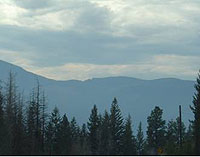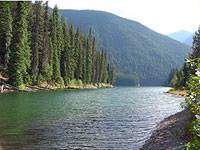|
 |
were pushed down by the angels to be near to it. These two places were near to each other, and acted as holding places until the final rewards were given.
Stories of such conversations are not uncommon in Jewish literature. The Jews looked to Abraham as their father and now the rich man called to his father Abraham, (not God) only to be reminded of the deeds he had done in his life. The rich man was the ideal for many Pharisees - he had dressed well and lived sumptuously, but however he had lived, it was a false security. Beggars were disdained by the Pharisees and when they died they were often thrown onto the fires of |
Hinnom (Gehenna). They were not buried. The rich man was buried. After their respective deaths, however, it is the rich man who goes to the fires, and the poor man, Lazarus, is carried by angels. It was too late now to change places and Father Abraham tells the rich man that a great gulf is fixed between the righteous and the wicked. He cannot now be helped. It is to stress that in this life preparation is to be made for our future. There is not to be a second chance.
Parables are rich in spiritual truth but are not a basis for doctrinal faith or argument. The essential elements of this story are to be found in Platonic literature that was known to the Pharisees and so Jesus would have been talking to them in a way that they could relate to, to show that once we have decided for or against God in this life, there is no later time to change sides. ‘He that is filthy, let him be filthy still… He that is holy, let him be holy still.’ The great gulf is fixed.
The Pharisees had derided Him and despised Him for receiving sinners and eating with them. Jesus was trying to show that we have an opportunity for salvation and that the opportunity must be |
 |
taken if we are to have eternal life. He added that even if one were to come back from the dead, they would not listen. Strangely enough, a short time later a man named Lazarus, the brother of Mary and Martha was raised from the dead by Jesus. But not even this evidence was sufficient to convert the hearts of those hardened Pharisees. John 11:46-53. Here is the teaching that Christ is taking out of the parable. This life is the time to choose ones destiny, there will be no second chance. Luke 16:26 ‘And beside all this, between us and you there is a great gulf fixed.’ |
Did not Jesus say to the thief on the cross ‘Today shalt thou be with Me in paradise’? Does not that show that we go to live somewhere else immediately we die? Please explain!
Here are the full verses. They are found in Luke 23:42, 43. ‘And he [the penitent thief] said unto Jesus, Lord, remember me when Thou comest into Thy kingdom. |
And Jesus said unto him, Verily I say unto thee, Today shalt thou be with Me in paradise.’ These were words of comfort and assurance to the thief. He had been crucified with Jesus, as had the other thief but, as he looked at Jesus, he saw an innocent man. He asked Jesus to remember him, and this was the response.
The first thing to notice about this text is that the punctuation has been added to the English versions. In Greek there is no punctuation. The choice of punctuation has to be guided by the sense of the words. In this case there are two options. The first is the one that the translators of the King James Bible chose, putting a comma after ‘today’ and giving ‘Today’ a capital letter. This was in line with their belief that you go to heaven when you die. They were showing here, the commonly taught understanding of Satan’s lie.
The other option is to consider the verse in line with the general Bible |
 |
|
<< Back | Page 1 | Page 2 | Page 3 | Page 4 | Page 5 | Page 6 | Page 7 | Page 8 | Page 9
| More >>
[ Home ][ About Us ][ Lonely Questions ][ Contact Us ]
Copyright © 2008 deathandbeyond.org.uk |
